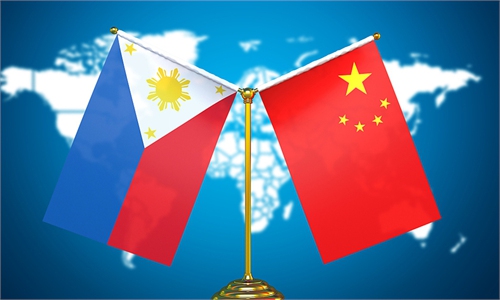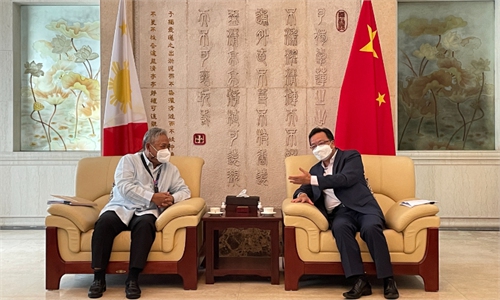China-Philippines relations expected to usher in a ‘new golden era’ with infrastructure cooperation a major highlight: envoy
Bilateral relations to usher in a ‘new golden era’ with infrastructure cooperation a key highlight: envoy
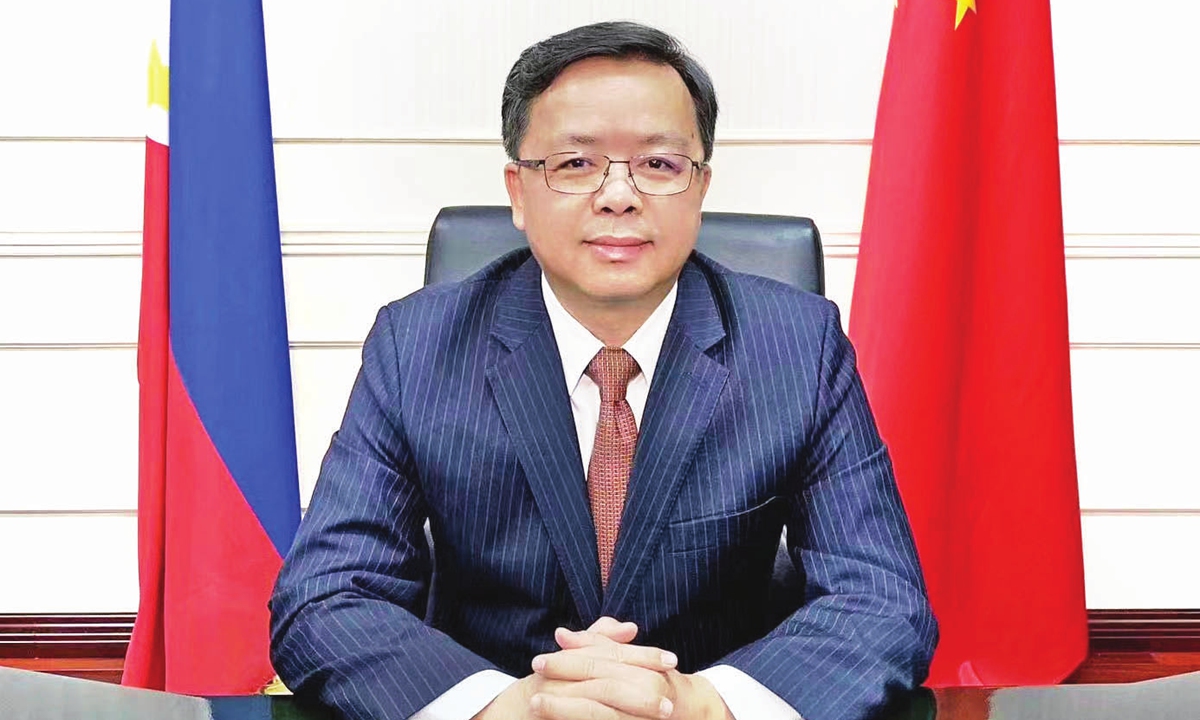
Chinese Ambassador to the Philippines Huang Xilian Photo: Courtesy of Chinese Embassy in Philippines
Editor's note:China and the Philippines are close neighbors facing each other across the sea. While it is normal for the two countries to have differences, the China-Philippines cooperation goes far beyond maritime differences, let alone define the relations between the two countries, as Chinese State Councilor and Foreign Minister Wang Yi stated. The Philippine President Ferdinand Marcos, Jr. said that China has always been the Philippines' strongest partner, a close neighbor, and a good friend. Among all the fruitful partnerships, infrastructure cooperation has been a highlight of bilateral relations over the past six years, with 17 projects already completed and more than 20 projects being implemented or in progress. Very recently, the promotion for joint development of offshore oil and gas has been highlighted in what could be another important cooperation that has the potential to be on the table. In an exclusive interview with the Chinese Ambassador to the Philippines Huang Xilian (Huang), he explained to the Global Times (GT) how the two sides can become good neighbors who help each other, good relatives who are close to each other, and good partners who can cooperate for win-win results.
GT: How do you evaluate the alignment of strategic plans between China and the Philippines in the past few years? And how to better promote the connection between China's Belt and Road Initiative (BRI) and the Philippines' "Build, Better, More" (BBM) Program in the future?
Huang: In the past six years, under the strategic guidance of the two heads of state, China-Philippines economic and trade cooperation has achieved fruitful results. The two sides have promoted the high-quality development of the joint construction of the "Belt and Road," and formed a virtuous circle of policy communication, facility connectivity, financial integration, unimpeded trade, and people-to-people bonds.
During this process, the pragmatic cooperation on projects between the two countries has made positive progress. Overall, there is a good situation in which intergovernmental projects and commercial projects go hand-in-hand and promote each other.
The two heads of state agreed that China and the Philippines should adhere to the general direction of good neighborliness and friendship and "draw a blueprint to the end" for friendly cooperation.
This provides a fundamental basis for the development of bilateral economic and trade cooperation. In the future, the Chinese side is willing to work with the Philippine side to unswervingly promote the joint construction of the BRI and the Philippines' BBM Program. The two sides will promote bilateral cooperation in the four major areas of agriculture , infrastructure, energy, and people-to-people and cultural engagement while exploring new growth points such as green and digital economy that both sides embrace and have strong complementarity.
The two sides will also jointly promote the construction of the "Two Countries, Twin Parks" that will jointly build demonstration parks for economic and trade innovation and development while promoting the deep integration of industrial chains, supply chains, and value chains between the two countries.
We believe that China-Philippines' pragmatic cooperation will not only bring more tangible benefits to the two peoples and will also make a meaningful contribution to regional prosperity and stability.
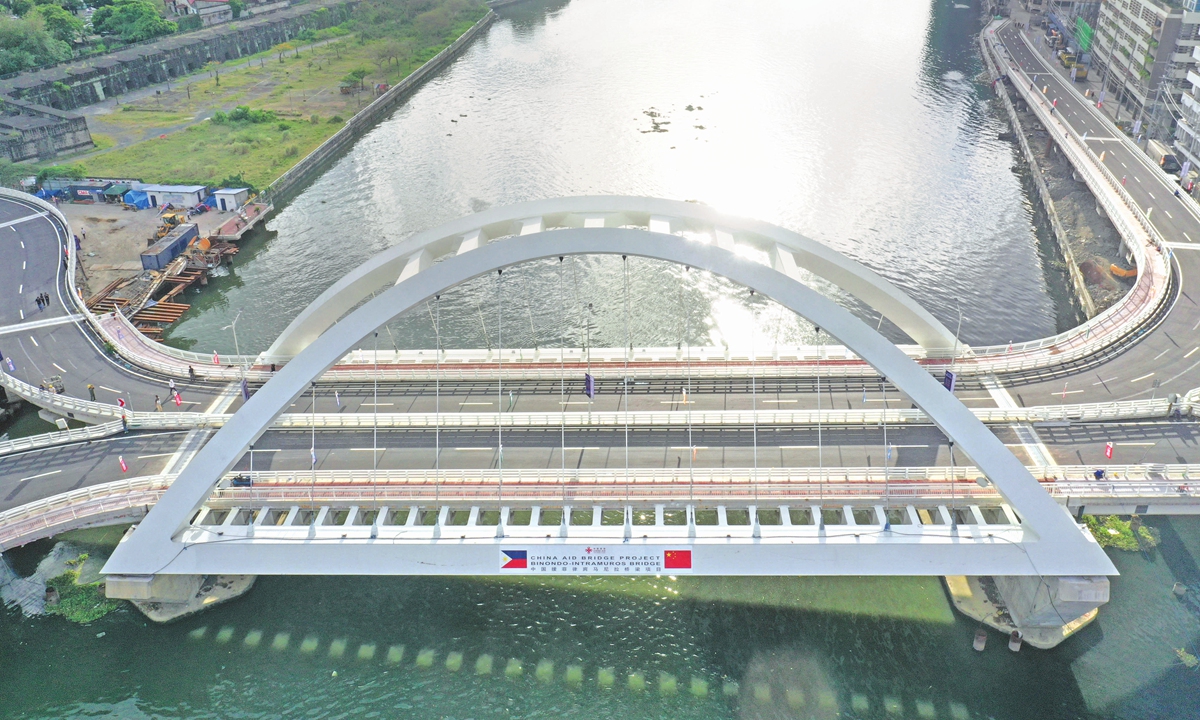
The Binondo-Intramuros Bridge in Manila,the Philippines Photo: cnsphoto
GT: How do you view the future cooperation potential of China-Philippines infrastructure cooperation?Huang: In the past six years, China and the Philippines have joined hands to deepen the construction of the BRI and the "Build, Build, Build" (BBB) Program, and have carried out nearly 40 intergovernmental cooperation projects.
Currently, 17 projects have been completed, and more than 20 projects are being implemented or in progress. Infrastructure cooperation has been a highlight of China-Philippines' pragmatic cooperation in the past six years. The two sides have cooperated to build bridges, pumping stations, and other key projects while gradually promoting infrastructure cooperation projects such as dams and railways.
After the China-funded Binondo-Intramuros bridge was completed and opened to traffic, it became a popular spot in Manila. Meanwhile, the Samal Island-Davao City Connector bridge project, which is attracting attention in the Philippines, is about to start.
China's investment in the Philippines hit a record high. The contracted investment in the Philippines from 2016 to 2021 reached 161 billion pesos ($2.73 billion), an increase of nearly three times over the previous six years. In particular, the third Philippine telecommunications operator project invested by China Telecom is progressing smoothly, covering more than 70 percent of the population, greatly promoting and improving the level of Philippine communications infrastructure.
Looking forward, China and the Philippines have great potential for cooperation in infrastructure fields such as transportation, energy, and digital economy, and have broad prospects for development.
The Chinese side is willing to work with the Philippine side to implement the important consensus reached by the leaders of the two countries and strengthen the connection between the BRI and the BBB Program in promoting practical cooperation in various sectors, including infrastructure.
China will work with the Philippines to expand and strengthen existing cooperation, cultivate and tap new growth points, create more benchmark projects for infrastructure cooperation, and help the country improve the level of traditional and new infrastructure, so as to create more benefits for the two peoples.
GT: How do you see the cooperation potential between China and the Philippines in high-speed rail network? Also, can you brief us on the progress of the three railway-related projects that China intends to invest in?
Huang: China has the longest high-speed railway network in the world and is the only country in the world that has achieved commercial operation of high-speed railways at speeds of 350 kilometers per hour. China has helped many countries realize their "railway dreams."
There are many good examples. The China-Laos Railway was opened to traffic in 2021 as the first modern railway in Laos. Moreover, the Jakarta-Bandung high-speed railway, a cooperation between China and Indonesia, is under construction and will become the first high-speed railway in Southeast Asia after completion.
The Philippines is a country of a thousand islands, and infrastructure connectivity is crucial to economic development. China has a lot of valuable experience in this field and is willing to share and provide corresponding support to the Philippines for its economic growth.
I am happy to say that, with the joint efforts of both teams, the China-Philippines railway cooperation project has been advancing in an orderly manner. The Chinese side is open to cooperation in infrastructure such as railways, has already communicated with the corresponding departments of the new Philippine government, and is willing to continue discussions with the Philippine side.
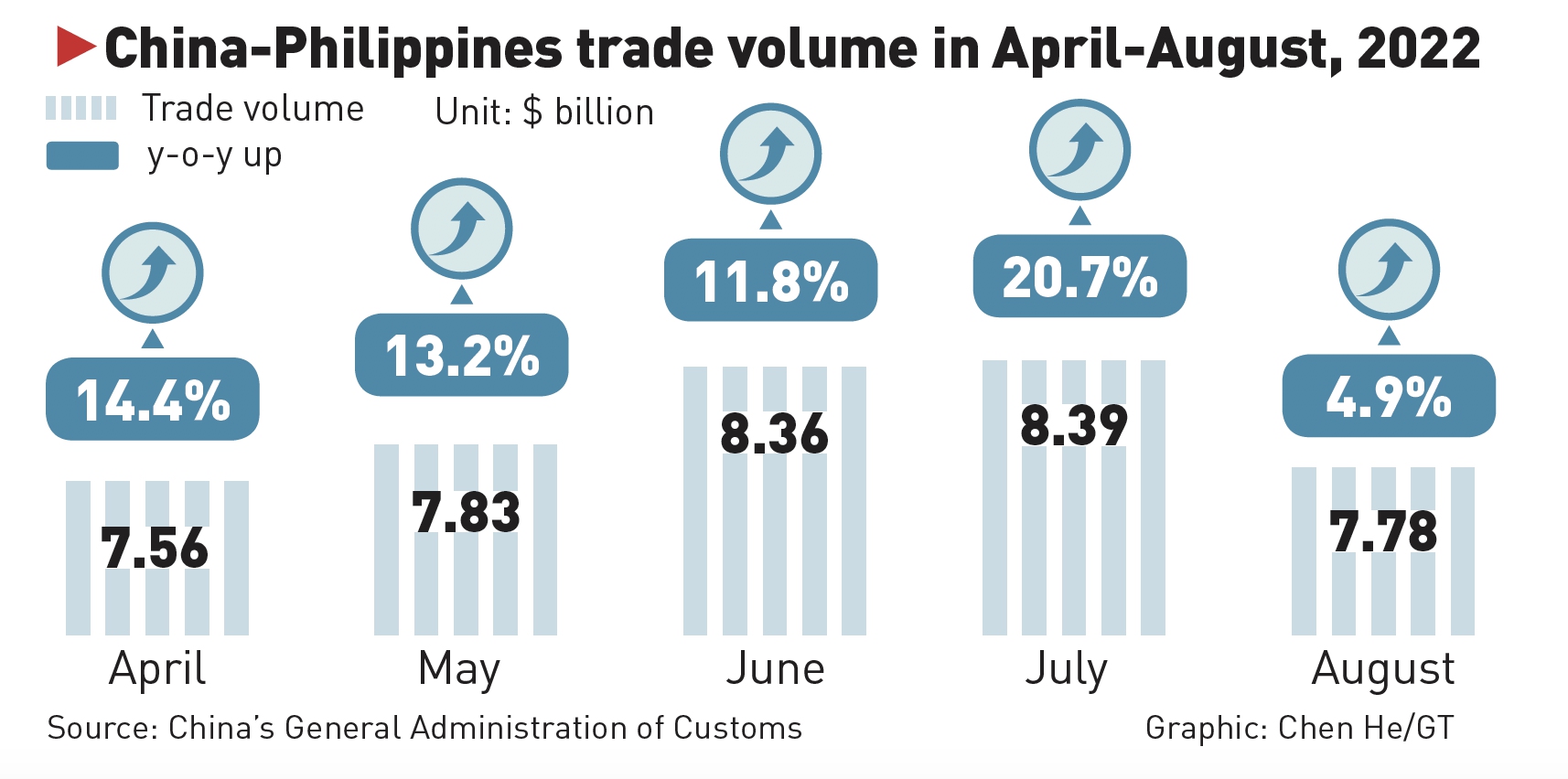
Graphic: Tang Tengfei/GT
GT: In addition to the "Belt and Road" cooperation, the joint development of offshore oil and gas between China and the Philippines has also attracted much attention. We have noted that President Marcos said in a recent media interview that the Philippines is interested in renewing talks with China on joint oil and gas exploration in the South China Sea to expand and diversify its sources of energy.What do you think of Marcos' remarks? Can you brief us on the progress of the joint development negotiations between the two countries?
Huang: The South China Sea issue is an inescapable issue between China and the Philippines, but it is by no means an "inextricable knot." Both China and the Philippines have realized that the South China Sea issue is not the whole picture of China-Philippines relations, let alone define the relations between the two countries.
As close neighbors facing each other across the sea, it is normal for China and the Philippines to have differences. The key is sticking in the right direction of properly handling differences, strengthening cooperation, and promoting the joint development of offshore oil and gas.
In 2005, as witnessed by the governments of China, the Philippines, and Vietnam, the three countries signed the Tripartite Agreement for Joint Marine Seismic Undertaking in the Agreement Area in the South China Sea.
In 2018, the leaders of the two countries reached an important consensus and signed an intergovernmental Memorandum of Understanding on Oil and Gas Development Cooperation. Since then, the two sides have carried out negotiations and consultations under this framework, with important progress already achieved. The Chinese side is willing to make joint efforts with the new Philippine government to advance the negotiation of joint development on the existing basis while striving to achieve results that benefit the two countries and the two peoples at an early date.
GT: How do you evaluate China-Philippines relations since the new Philippine President took office? What is your outlook for the future development of China-Philippines relations?
Huang: The Philippines is an important neighbor of China, and the friendly exchanges between the two countries have lasted for thousands of years. At present, China-Philippines relations are standing at a new historical starting point. Since President Marcos took office, high-level exchanges between the two countries have continued.
Three high-level delegations, including Vice President Wang Qishan, State Councilor and Foreign Minister Wang Yi, and Minister of the International Department of the CPC Central Committee Liu Jianchao, visited the Philippines one after another, which showed that China attaches great importance to China-Philippines relations and supports the administration of the Marcos government.
With the joint efforts of both sides, China-Philippines relations have made a good start. As President Marcos said at the awarding ceremony of the second "Award for Promoting Philippines-China Understanding (APPCU)," China has always been the Philippines' strongest partner, a close neighbor, and a good friend.
The Chinese side is willing to work with the Philippine side, in accordance with the spirit of the telemeeting between the two heads of state, to "draw a blueprint to the end" for China-Philippines friendly cooperation, so as to promote the acceleration of bilateral relations and the upgrading of mutually beneficial cooperation.
At the same time, it is expected that the two sides become good neighbors who help each other, good relatives who are close to each other, and good partners who can cooperate for win-win results, so as to jointly usher in a "new golden era" of bilateral relations. I have full confidence in the future development of China-Philippines relations.
